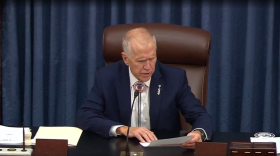Full federal recognition of North Carolina’s Lumbee Tribe got a boost with President Donald Trump expressing support for a U.S. Senate bill that could bring millions of dollars in additional funding to this Native American community.
The tribe, based in Robeson County and with 55,000 members primarily in southeastern North Carolina, received limited recognition from the federal government in the 1950s, The Fayetteville Observer reported.
“For more than a century, the Lumbee Tribe of North Carolina has sought federal recognition, but has been met with indifference and red tape,” Trump said in a White House statement released Wednesday announcing his support for the bill. “Lumbee Nation is forgotten no more!”
Harvey Godwin, the tribe’s elected chairman, said support for full recognition from Trump and North Carolina Sens. Richard Burr and Thom Tillis is very positive but doesn’t mean it’s a done deal. Burr is the lead sponsor of the Senate measure.
“It’s not 100% it’s going to happen -- a lot of things can happen between now and the end of the year — but it’s just another big step,” Godwin said. The Senate measure also would allow the tribe to open a casino in Robeson County. Godwin said a casino wouldn't happen unless tribe members back one in a referendum.
Trump’s announcement comes less that two weeks before Election Day, when he and Tillis will be on the ballot. Voters in Robeson County, which used to be reliably Democrat, have backed Republican candidates more in recent years. Democratic presidential nominee Joe Biden’s campaign expressed earlier this month support for a Lumbee bill in the U.S. House. That measure doesn’t specify whether the Lumbees could build a casino.
The Eastern Band of the Cherokee Indians, the only tribe with full federal recognition in North Carolina, has opposed similar recognition for the Lumbees. The Eastern Band operates two casinos in far western North Carolina.
Trump’s statement came the same day roughly 40 people protested outside a Lumbee tribe housing complex in Pembroke demanding more accountability of tribal spending, The Robesonian reported.








